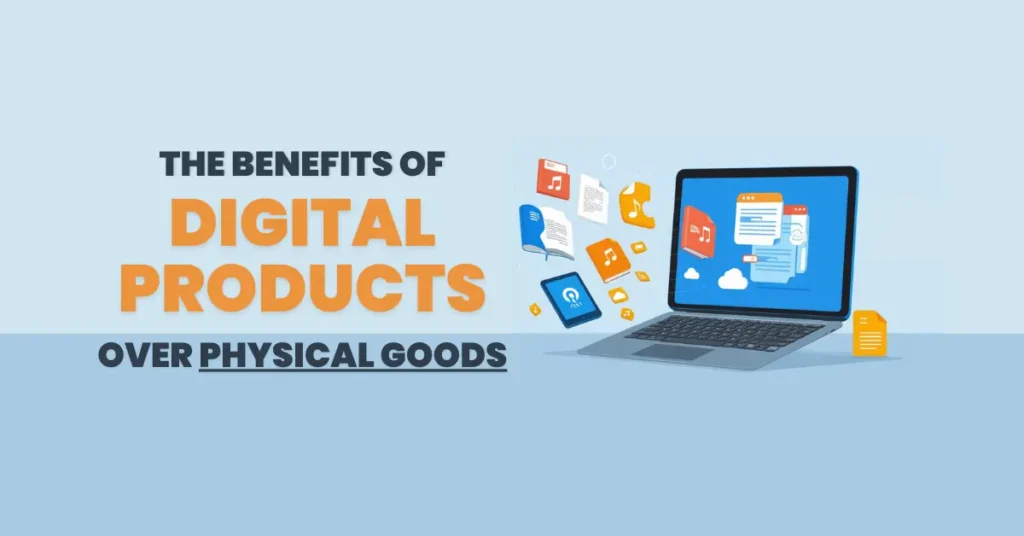The Benefits of Digital Products Over Physical Goods
Introduction
In today’s fast-paced, tech-driven world, digital products have become a cornerstone of daily life. From e-books to software, digital products offer unparalleled convenience and efficiency. This article delves into the myriad benefits of digital products over their physical counterparts, highlighting why they are becoming the preferred choice for many consumers and businesses alike.
What Are Digital Products?
Digital products are intangible items that exist in a digital format. Unlike physical goods, which require manufacturing, packaging, and shipping, digital products can be delivered electronically. Examples include e-books, software, online courses, music files, and digital art.
Cost Efficiency
One of the most significant advantages of digital products is their cost efficiency. Unlike physical goods, digital products do not require raw materials, production facilities, or transportation. This translates to lower production costs and, consequently, lower prices for consumers. Additionally, there are no shipping fees, which can be a substantial saving, especially for international purchases.
Instant Delivery
With digital products, there’s no waiting for delivery. As soon as a purchase is made, the product can be downloaded or accessed immediately. This instant gratification is a major convenience for consumers, allowing them to start using their products right away.
Environmental Impact
Digital products are significantly more environmentally friendly than physical goods. They require no packaging, reduce the need for transportation, and result in less waste. The reduction in paper use alone, through products like e-books and digital documents, makes a considerable positive impact on the environment.
Scalability
Digital products are incredibly scalable. Once a product is created, it can be duplicated and distributed globally with minimal additional costs. This scalability allows creators to reach a wider audience without the logistical challenges associated with physical goods.
Storage and Space
Physical goods require storage space, which can be both costly and cumbersome. Digital products, on the other hand, are stored electronically and take up no physical space. This makes them easier to organize and manage, whether you’re an individual consumer or a business.
Durability and Longevity
Digital products do not suffer from wear and tear. A physical book might get damaged over time, but an e-book remains pristine. This durability ensures that digital products can be used indefinitely, provided they are backed up and stored securely.
Up-to-Date Content
One of the standout features of digital products is their ability to be updated easily. Software updates, content revisions, and new editions can be distributed instantly, ensuring that users always have access to the most current information and features.
Customization and Personalization
Digital products can often be customized to meet individual needs. Whether it’s software that adapts to a user’s workflow or an online course that allows learners to progress at their own pace, this level of personalization enhances the overall user experience.
Accessibility
Digital products are accessible from anywhere with an internet connection. This is especially beneficial for people in remote areas who may not have easy access to physical goods. Digital products break down geographical barriers, making it easier for everyone to access the tools and resources they need.
Enhanced Security
Digital products come with advanced security features like Digital Rights Management (DRM) to prevent unauthorized copying and distribution. Additionally, secure payment gateways and encryption ensure that transactions are safe and personal data is protected.
Versatility
The versatility of digital products is another key advantage. They can be offered in various formats (e.g., PDF, MP3, MP4) and can be used across multiple devices (e.g., smartphones, tablets, computers). This flexibility makes them suitable for a wide range of applications.
Support and Customer Service
Many digital products come with robust support and customer service options. Users can often access help through online forums, chat support, or comprehensive FAQs, ensuring they can resolve any issues quickly and efficiently.
Conclusion
In summary, digital products offer numerous benefits over physical goods, from cost efficiency and instant delivery to environmental sustainability and enhanced security. As technology continues to advance, the prevalence and advantages of digital products are only set to increase. Whether you’re a consumer or a business, embracing digital products can lead to significant improvements in convenience, efficiency, and overall satisfaction.
FAQs
1. What are digital products?
Digital products are intangible items that can be delivered electronically, such as e-books, software, online courses, and digital art.
2. How do digital products save money?
Digital products save money by eliminating the costs associated with manufacturing, packaging, and shipping physical goods.
3. Can digital products be customized?
Yes, many digital products can be tailored to individual preferences, enhancing the user experience.
4. Are digital products environmentally friendly?
Absolutely. Digital products reduce the need for physical materials, transportation, and packaging, significantly lowering their environmental impact.
5. How do I ensure the security of my digital products?
Ensure your digital products are protected by using secure payment gateways, encryption, and Digital Rights Management (DRM) to prevent unauthorized access and copying.


